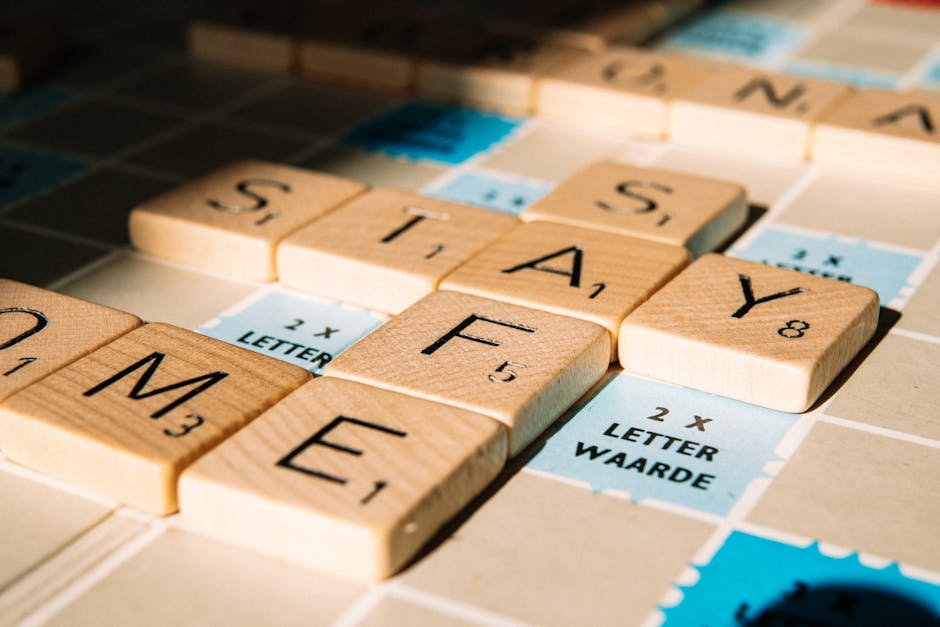Remember that feeling? The one where you’re staring at a bunch of jumbled up letters on a screen, or maybe on a piece of paper during a game night, and your brain just… stops. Like, the answer is right there, you know it, but it’s hiding. It’s a total mess. Seriously. For years, this was me. I’d be playing Scrabble or some word puzzle, and my friends would be practically done with their turn before I’d even figured out three letters. It was kinda embarrassing, not gonna lie.
But then, something clicked. Or maybe I just got tired of losing. Whatever it was, I started looking into how people who are, like, really good at this stuff, how they do it. And it turns out, it’s not magic. It’s not even just about having a huge vocabulary (though that helps, obviously). It’s more about a certain way of looking at those messed-up letters. It’s about a few tricks, some mental shortcuts, and knowing when to use what. And honestly, once you get a handle on it, it feels pretty cool. Being able to unscramble words quickly? Yeah, that’s a superpower in some circles, I think. Especially in 2025, where word games are still super popular, maybe even more so with all the new apps out there.
Getting Your Brain Ready for Word War
So, what’s the big secret, right? Well, there isn’t one huge secret, more like a bunch of little things that add up. First off, you gotta get your head in the game. What I mean is, don’t just stare blankly. That’s what I used to do, and it got me nowhere fast. Instead, kinda like, clear your mental desk. Make some space.
One thing that helped me a lot was just chilling out. When you’re stressed, your brain kinda locks up, you know? So, deep breath. Look at the letters. Don’t worry about getting it right away. Just observe them. It’s like when you’re trying to find your phone and you’re panicking, and then you realize it was in your hand the whole time. Same energy.
What’s interesting is how your brain processes letters. It doesn’t just see them as individual pieces; it tries to group them. And sometimes, that grouping can throw you off if it’s wrong. My trick? I like to jot the letters down, if I can. Writing them out, especially in a different order, gives your brain a fresh look. Not just typing them into an unscrambler tool – though those are handy, don’t get me wrong, especially for checking your work or when you’re totally stuck. But for learning to do it yourself, the physical act of writing or rearranging helps.
The Nitty-Gritty of Letter-Crunching
Alright, let’s talk about some specific things you can do. These are the real deal, the stuff that made a difference for me.
Vowels and Consonants First: This is like, Word Unscrambling 101. Seriously, count ’em. How many vowels (A, E, I, O, U, sometimes Y)? How many consonants? Most English words have a pretty regular ratio. If you’ve got seven letters and only one vowel, well, that’s probably a short word with lots of consonants, or maybe a word with a ‘Y’ acting like a vowel. It’s a clue. A really good one.
Common Letter Combos: Think about letter pairs or triples that pop up all the time. Like, “TH,” “SH,” “CH,” “QU,” “ER,” “ING,” “ED,” “ION.” When you see a “Q” in your scramble, your brain should immediately go, “Oh, where’s the ‘U’?” Cause, usually, there’s a “U” after a “Q.” Same with “NG” – often appears at the end of words or in the middle. Spotting these small groups quickly helps you break down the larger jumble into smaller, more manageable chunks. It’s like finding mini-words within the big, confusing word.
Prefixes and Suffixes: English, man, it’s wild with all its little bits and pieces. Words often start with things like “UN-“, “RE-“, “IN-“, “PRE-“, and end with “-ING”, “-ED”, “-S”, “-LY”, “-TION”. If you see those letters in your scramble, try pulling them aside. For example, if you have “L E S S E N U”, and you see “UN”, what’s left? “L E S S E”. Then maybe you see “LESS”. Boom. “UNLESS”. Sometimes, it’s that easy. Sometimes, it’s not. But it’s a place to start.
Word Length Matters: You got seven letters? Don’t spend ages looking for a two-letter word. Chances are it’s a longer one. And vice-versa. If it’s a short scramble, say three or four letters, you’re looking for a common, short word. Your brain should switch gears based on how many letters you’re dealing with.
Look for Short Words First: This might sound weird, but if you have, say, eight letters, try to find a three-letter word from those letters. Or a four-letter one. Often, the longer word will contain smaller, complete words within it. Like, if you have “T A R E S M”, you might spot “STAR” or “RATE”. Then you can see what letters are left and try to build on those. Maybe “MASTER”. It’s like chipping away at a block of ice. Bit by bit.
The Power of Ends: Where do words usually end? With common letters like E, S, D, N, T. What about beginnings? T, A, S, I, O. If you have a bunch of these, try putting them at the start or end of potential words. For instance, if you have “D L R O W”, you might immediately think “WORD” because of how “W” and “D” often frame words.
Say It Out Loud (or in your head): Sometimes, just vocalizing the letters or even potential partial words can trigger something. Your auditory memory can kick in. “T-A-B-L-E?” “No, wait. L-A-B-E-L?” Sometimes hearing it helps your brain connect the dots. It sounds kinda silly, but it works for me.
Practice, Practice, and More Practice (Yeah, it’s that simple)
The more you do it, the better you get. It’s like learning to ride a bike or playing a musical instrument. You won’t be a maestro overnight. But every time you try to unscramble words quickly, your brain gets a little faster at recognizing patterns. It builds those mental pathways.
There are tons of free word unscrambler tools online, right? Use them. Not just to get the answer, but to learn the answer. If you can’t figure out a word, pop it into a tool, see the solution, and then try to work backwards. Why was that the word? What patterns did you miss? This reverse-engineering thing is pretty effective. I do it all the time.
Also, play games. Lots of them. Scrabble, Words with Friends, daily crosswords, even those word search puzzles. Anything that gets you messing around with letters and words. The more exposure your brain gets to how words are put together, the better it becomes at taking them apart and putting them back together in a new way.
Unscrambling Beyond Games: Why Bother?
So, okay, unscrambling words quickly is fun for games. But is there more to it? I think so. For one, it’s a pretty decent brain exercise. Keeps your mind sharp. It makes you think flexibly, which is a good skill to have, not just for word puzzles, but for, like, everything in life. Problem-solving, basically. When you’re faced with a jumble of letters, you’re trying to solve a tiny puzzle, right? And that skill, figuring stuff out, it kinda bleeds into other areas.
It also helps with your vocabulary. Seriously! When you’re constantly seeing new words or new arrangements of letters, you pick up on stuff. You might even find yourself looking up words you didn’t know existed after seeing them come up as an unscrambled solution. And a bigger vocabulary? That’s always a win, in my book. Makes you better at writing, better at reading, better at talking.
And think about it. If you can unscramble words quickly, it can actually help with spelling sometimes. You start to see words as collections of common letter groups, not just a string of individual letters. So if you’re trying to spell a tricky word, you might subconsciously remember those groups and piece it together more accurately. It’s a nice little bonus skill you pick up.
Tools and Tricks for When You’re Really Stuck
Look, sometimes you just hit a wall. Happens to the best of us. That’s when it’s totally okay to pull out the big guns.
Online Unscramblers: Yeah, I mentioned them before. There are a bunch out there. You type in your letters, and boom, it spits out every possible word. They’re super handy for when you’re desperate, or like I said, to learn from. Just type “unscramble words quickly” into your search engine, and you’ll find tons.
Dictionary Apps: Keep one on your phone. If you have a few letters that feel like a word, but you can’t quite place it, or you’re not sure if it’s a real word, a quick dictionary check can clear it up.
Timer Practice: Try giving yourself a time limit. Like, “I’m going to solve this one in 30 seconds.” The pressure can sometimes help, or at least train you to think faster. Don’t stress if you don’t make it, just try again.
Break It Down Visually: Some people like to write the letters in a circle, or in different rows, just to break the pattern. Your brain processes things differently when they’re arranged in a new way.
So, yeah, unscrambling words quickly? It’s not just a party trick. It’s a pretty cool way to keep your brain active, grow your word power, and honestly, impress your friends a little. Give it a shot. You might surprise yourself.
FAQs about Unscrambling Words Quickly
Q1: What’s the best way to get really fast at unscrambling words?
A: Practice, practice, and more practice! Seriously, try to do it regularly. Learning common letter patterns, prefixes, and suffixes helps a ton. And don’t be afraid to use online tools to check your answers and see what you missed.
Q2: Are there specific letters that are harder to unscramble?
A: Letters like J, Q, X, Z are often tricky because they appear less frequently in words and have fewer common combinations. If you see them, try to build around them using common vowels or high-frequency consonants first.
Q3: Can unscrambling words help with my vocabulary?
A: Absolutely! When you’re constantly exposed to new words, either by solving puzzles or using an unscrambler to find answers, you’ll naturally pick up more words and learn how they’re spelled and structured. It’s a fun way to grow your word knowledge.
Q4: Is it okay to use an online word unscrambler tool?
A: Totally! They’re super useful. For learning, you can use them to see the correct answer and then figure out why that was the word. For games, if you’re not trying to cheat, they can help you understand the possibilities and broaden your thinking about letter combinations.
Q5: What’s a good first step when I’m trying to unscramble a long word?
A: First, count your vowels and consonants. Then, look for common two- or three-letter combinations (like TH, SH, ER, ING). Try to find smaller words hidden within the longer jumble. It makes the big problem feel smaller.




